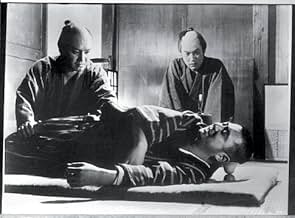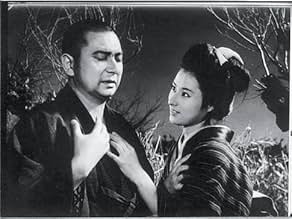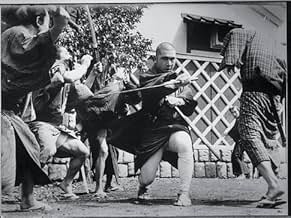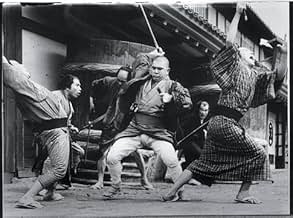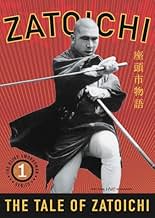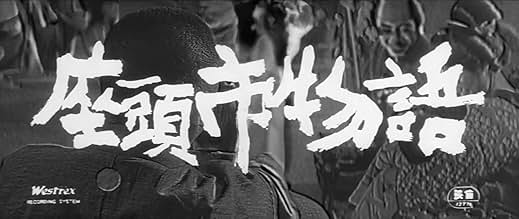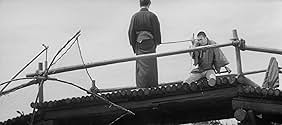IMDb RATING
7.6/10
6.2K
YOUR RATING
The adventures of a blind, gambling masseur who also happens to be a master swordsman.The adventures of a blind, gambling masseur who also happens to be a master swordsman.The adventures of a blind, gambling masseur who also happens to be a master swordsman.
- Awards
- 1 nomination total
Toshio Chiba
- Masakichi
- (as Toshirô Chiba)
Yoshindo Yamaji
- Yahei
- (as Yoshito Yamaji)
- Director
- Writers
- All cast & crew
- Production, box office & more at IMDbPro
Featured reviews
"Zatôichi Monogatari" aka. "The Tale of Zatoichi" (1962) is the fantastic start to the longest and most famous series of Samurai films, the wonderful "Zatôichi" series about the eponymous blind swordsman, gambler and masseur impersonated by the great Shintarô Katsu. Katsu is one of my personal favorite actors, and I am equally an admirer of the brilliant director he often worked with, the great Kenji Misumi. This first film in the series, as well as several more to come, was directed by Misumi, in my opinion one of the greatest Japanese directors of all-time. My personal favorite films by Misumi will always be the brilliant "Kozure Okami" (aka. "Lone Wolf And Cub") films (1972-1974) starring Shintaro Katsu's equally great brother Tomisaburo Wakayama (four out of the six films were directed by Misumi). The outrageous Samurai-Exploitation classic "Hanzo The Razor - Sword Of Justice" (OT: "Goyôkiba") starring Katsu himself also has a special place in my heart. It was the "Zatôichi" films, however, that made Misumi a known director and brought Katsu to stardom, and the series has long obtained an enormous cult-status. In total, Katsu played the role of Zatoichi in 26 films as well as in a 100-episode TV-series that ran between 1974 and 1979. Misumi directed six of the films, as well as many episodes of the series.
The reasons why the Zatôichi franchise enjoys such an enormous cult-status are numerous, but I will stick to the most important ones. The eponymous hero, Zatôichi must be the most likable character ever in cinema to work as a hired sword. Zatôichi, a blind masseur, has obtained his sword skills because he was tired of being looked down upon by others, as usual for blind people in Feudal Japan. Due to his excellent sword-skills, he makes a good living as a hired swordsman. His senses of smell and hearing are as excellent as his swordsmanship, which makes him one of the most powerful swordsmen. Even so, Zatôichi is a kind, gentle and humorous man by nature, who will rather solve problems otherwise than having to kill someone. Shintaro Katsu is brilliant in the role of his life, and I cannot imagine for anyone else to fit the role like Katsu did. Cult-filmmaker Takeshi Kitano (of whom I am a great fan) took a new turn on the role in 2003 - Katsu had passed away in 1997 - and did so greatly. Yet, to me, the only true Zatoichi will always be Shintaro Katsu. This first film in the series is one of only two that were filmed in black and white, and it already epitomizes what makes the brilliance of the series. "Zatôichi Monogatari" mixes Smurai Action with Comedy, Drama and philosophical elements. The film begins with the crafty Zatôichi, who tricks a bunch of fellow gamblers into underestimating him... The film marks the beginning to a great and highly successful series that may not be missed by any lover of Japanese cinema. I had seen several other "Zatôichi" films with Katsu, as well as the 2003 film with (and by) Kitano before seeing this one. The action is great in this first film, but it is the plot that outweighs the fighting by far. Overall, "Zatôichi Monogatari" is a fantastic piece of cult-cinema and everybody even remotely interested in Japanese films must see it.
The reasons why the Zatôichi franchise enjoys such an enormous cult-status are numerous, but I will stick to the most important ones. The eponymous hero, Zatôichi must be the most likable character ever in cinema to work as a hired sword. Zatôichi, a blind masseur, has obtained his sword skills because he was tired of being looked down upon by others, as usual for blind people in Feudal Japan. Due to his excellent sword-skills, he makes a good living as a hired swordsman. His senses of smell and hearing are as excellent as his swordsmanship, which makes him one of the most powerful swordsmen. Even so, Zatôichi is a kind, gentle and humorous man by nature, who will rather solve problems otherwise than having to kill someone. Shintaro Katsu is brilliant in the role of his life, and I cannot imagine for anyone else to fit the role like Katsu did. Cult-filmmaker Takeshi Kitano (of whom I am a great fan) took a new turn on the role in 2003 - Katsu had passed away in 1997 - and did so greatly. Yet, to me, the only true Zatoichi will always be Shintaro Katsu. This first film in the series is one of only two that were filmed in black and white, and it already epitomizes what makes the brilliance of the series. "Zatôichi Monogatari" mixes Smurai Action with Comedy, Drama and philosophical elements. The film begins with the crafty Zatôichi, who tricks a bunch of fellow gamblers into underestimating him... The film marks the beginning to a great and highly successful series that may not be missed by any lover of Japanese cinema. I had seen several other "Zatôichi" films with Katsu, as well as the 2003 film with (and by) Kitano before seeing this one. The action is great in this first film, but it is the plot that outweighs the fighting by far. Overall, "Zatôichi Monogatari" is a fantastic piece of cult-cinema and everybody even remotely interested in Japanese films must see it.
Zatoichi (Shintaro Katsu) is a blind masseuse (masseuse was a traditional occupation for the blind in Japan) who took up sword fighting to gain more respect ("Zato" is actually a title--"Ichi" was his name; "Zato" was the lowest title in the traditional guild for the blind). He quickly mastered the art--far surpassing the average sword fighter and even the average samurai--as he seems to have a sixth sense. This film has Zatoichi visiting Sukegoro (Eijiro Yanagi) of Iioka, to "cash in" on some owed hospitality. He begins by slightly conning Sukegoro's gang in a gambling game involving dice. Shortly afterward, he learns that Sukegoro's gang is about to enter a war with Shigezo's (Ryuzo Shimada) rival Sasagawa gang. Shigezo has enlisted the services of Hirate (Shigeru Amachi), a famed samurai. Will Zatoichi help Sukegoro win his battle?
This is the first in a series of 26 Zatoichi films (and a television series that ran for four seasons in the 1970s), all starring Katsu in the title role. Remarkably, 25 of the Zatoichi films were made in little more than a ten-year period. This first film was based on a short story by Kan Shimozawa.
I haven't seen most of the Zatoichi films yet, and I hadn't seen any of them for a long time, so it's difficult for me to compare Zatoichi 1 with the rest of the series, but I was slightly disappointed with this film. It's a bit too much in the realm of realist drama for my tastes, and as such, moves at a slow clip. There are no big fight scenes until the last 20 minutes or so, and those aren't filmed, directed or choreographed very spectacularly. But the black and white cinematography (which only lasted for one more Zatoichi film) is frequently arresting and the dramatic material does present some intriguing situations, many concerned with various shades of ethical grayness. If you're in the market for an Asian "art-house" drama with a slight martial arts edge, Zatoichi 1 may be just the film for you. If you're looking for something more visceral, or for exciting action, it would probably be safe and wiser to start later in the series.
The visual style caught my attention more often than any other aspect of Zatoichi. Director Kenji Misumi, who went on to do five more Zatoichi films after this one, has cinematographer Chishi Makiura shoot in a stark black and white that has a strong, even exaggerated film noirish edge. The whites can be almost blinding and the darks are pitch black. There are a lot of shadows. Much of the film takes place at night and indoors. It's an attractive way to use the minimal sets. The scenes set in different environments are pleasant in their contrast. A scene at a lakeside begins with a Zen Art-styled water through branches shot. The big fight scene near the end has some interesting lake shots and even better village labyrinth shots. The climactic Western (the genre)-like showdown on a bridge is also nicely staged and photographed.
The story, using a script by Minoru Inuzuka, focuses on interesting character arcs for the two principals--Zatoichi and Hirate. Especially Zatoichi has a questionable morality when the film begins, but both gradually come to be more concerned with being honorable, just and unselfish by the film's end. This is in contrast to the characters embroiled in romantic relationship dilemmas--Otane (Masayo Banri), Tatekichi (Michio Minami) and Seisuke (Manabu Morita), and even the gang bosses, Shigezo and Sukegoro, who all have little to no character development arc, although Otane is already ethically good (per the conventional wisdom) at the beginning of the film.
But Zatoichi and Hirate are initially set against each other as surrogate representatives of warring "families", in what amounts to a yakuza/samurai version of Romeo & Juliet (and by extension West Side Story, 1961). Of course there is no romantic angle between Zatoichi and Hirate, but there is a deep respect and a bonding through a brotherly love that eventually triumphs in its own way over "turf wars". There is an expected end to their relationship, but the appearance of this development (most significantly to the gang bosses) is quite different than what is actually going on between the two of them. The romantic angle is covered instead by Zatoichi's relationship with Otane, which has the appropriate air of being forbidden to cover the Romeo and Juliet/West Side Story analogy, and which also ends up being defined by an intriguing selflessness that rarely rears its head in western (the culture) films.
Zatoichi is a fascinating character. Katsu doesn't have a typical martial arts or action star look--already in this film, he appears to be middle aged (beyond his actual age of 30 at the time of shooting) and a bit chubby. His "sixth sense" abilities and cunningness verge on the magical, as do his swordsmanship skills. The character isn't nearly as well explored here as he could be, but given that there were 25 more films to come (and a recent remake with a new Zatoichi), I suppose it's more excusable.
It doesn't help that it takes awhile to get up to speed on the relatively large cast of characters with sometimes complex relationships to one another (especially if you're like me and you have trouble remembering character names as well as trouble remembering who is who when characters have similar looks), but once you figure out that it's a kind of West Side Story, it's easy enough to get the gist of events unfolding.
This is the first in a series of 26 Zatoichi films (and a television series that ran for four seasons in the 1970s), all starring Katsu in the title role. Remarkably, 25 of the Zatoichi films were made in little more than a ten-year period. This first film was based on a short story by Kan Shimozawa.
I haven't seen most of the Zatoichi films yet, and I hadn't seen any of them for a long time, so it's difficult for me to compare Zatoichi 1 with the rest of the series, but I was slightly disappointed with this film. It's a bit too much in the realm of realist drama for my tastes, and as such, moves at a slow clip. There are no big fight scenes until the last 20 minutes or so, and those aren't filmed, directed or choreographed very spectacularly. But the black and white cinematography (which only lasted for one more Zatoichi film) is frequently arresting and the dramatic material does present some intriguing situations, many concerned with various shades of ethical grayness. If you're in the market for an Asian "art-house" drama with a slight martial arts edge, Zatoichi 1 may be just the film for you. If you're looking for something more visceral, or for exciting action, it would probably be safe and wiser to start later in the series.
The visual style caught my attention more often than any other aspect of Zatoichi. Director Kenji Misumi, who went on to do five more Zatoichi films after this one, has cinematographer Chishi Makiura shoot in a stark black and white that has a strong, even exaggerated film noirish edge. The whites can be almost blinding and the darks are pitch black. There are a lot of shadows. Much of the film takes place at night and indoors. It's an attractive way to use the minimal sets. The scenes set in different environments are pleasant in their contrast. A scene at a lakeside begins with a Zen Art-styled water through branches shot. The big fight scene near the end has some interesting lake shots and even better village labyrinth shots. The climactic Western (the genre)-like showdown on a bridge is also nicely staged and photographed.
The story, using a script by Minoru Inuzuka, focuses on interesting character arcs for the two principals--Zatoichi and Hirate. Especially Zatoichi has a questionable morality when the film begins, but both gradually come to be more concerned with being honorable, just and unselfish by the film's end. This is in contrast to the characters embroiled in romantic relationship dilemmas--Otane (Masayo Banri), Tatekichi (Michio Minami) and Seisuke (Manabu Morita), and even the gang bosses, Shigezo and Sukegoro, who all have little to no character development arc, although Otane is already ethically good (per the conventional wisdom) at the beginning of the film.
But Zatoichi and Hirate are initially set against each other as surrogate representatives of warring "families", in what amounts to a yakuza/samurai version of Romeo & Juliet (and by extension West Side Story, 1961). Of course there is no romantic angle between Zatoichi and Hirate, but there is a deep respect and a bonding through a brotherly love that eventually triumphs in its own way over "turf wars". There is an expected end to their relationship, but the appearance of this development (most significantly to the gang bosses) is quite different than what is actually going on between the two of them. The romantic angle is covered instead by Zatoichi's relationship with Otane, which has the appropriate air of being forbidden to cover the Romeo and Juliet/West Side Story analogy, and which also ends up being defined by an intriguing selflessness that rarely rears its head in western (the culture) films.
Zatoichi is a fascinating character. Katsu doesn't have a typical martial arts or action star look--already in this film, he appears to be middle aged (beyond his actual age of 30 at the time of shooting) and a bit chubby. His "sixth sense" abilities and cunningness verge on the magical, as do his swordsmanship skills. The character isn't nearly as well explored here as he could be, but given that there were 25 more films to come (and a recent remake with a new Zatoichi), I suppose it's more excusable.
It doesn't help that it takes awhile to get up to speed on the relatively large cast of characters with sometimes complex relationships to one another (especially if you're like me and you have trouble remembering character names as well as trouble remembering who is who when characters have similar looks), but once you figure out that it's a kind of West Side Story, it's easy enough to get the gist of events unfolding.
A tale of warring townships and two strong characters who cant help but being pawns in a horrible game of carnage. Set in rural Japan in feudal times the setting is beautiful.
Too bad the camera works don't quite follow up. The scope is 70mm (or close to it), but I could settle with less if the cameraman (I suspect they didn't have one) didn't cut off the heads all the time. The use of zoom-lens sometimes works and sometimes don't. One time zooming in on Tane-san for instance was very dramatic. Intense was also the battle scenes. Very good.
Zatoichi is a good character and the actor playing him is fitting. The story is good and makes for an intriguing film despite some flaws. In all respects I think its inferior to Sanjuro though.
This is my first Zatoichi and I will check out other entries in the series for sure (at least the Kitano "Zatoichi" from 2003 is easy to get hold on).
Too bad the camera works don't quite follow up. The scope is 70mm (or close to it), but I could settle with less if the cameraman (I suspect they didn't have one) didn't cut off the heads all the time. The use of zoom-lens sometimes works and sometimes don't. One time zooming in on Tane-san for instance was very dramatic. Intense was also the battle scenes. Very good.
Zatoichi is a good character and the actor playing him is fitting. The story is good and makes for an intriguing film despite some flaws. In all respects I think its inferior to Sanjuro though.
This is my first Zatoichi and I will check out other entries in the series for sure (at least the Kitano "Zatoichi" from 2003 is easy to get hold on).
10eam4375
I normally wouldn't dare rate a movie a 10. However for the first Zatoichi film (and maybe the second) I make an exception. An incredible tale of a flawed man at peace with the fact that he is a gangster. Zatoichi is forced into situation after situation where honor and compassion make us side with this blind man, not because of his handicap, but because he is doing the right thing. Filmed in black and white the action is superbly choreographed to convey the intensity of each situation without one bright red spray of blood across the screen. If you only watch one Samurai movie, make it this one. If you love it, then the first 25 of these masterpieces are coming to Blu Ray courtesy of Criterion this November.
"The Tale of Zatoichi" was a cultural phenomenon in Japan in the 1960s, spawning 25 sequels, a 112-episode TV series and a remake.
Set toward the end of the feudal Edo period (1603-1868), the film stars Shintaro Katsu as Zatoichi, an itinerant blind masseur/swordsman. He stops in the town of Iioka one day to stay with a yakuza boss, Sukegoro, who he had met on an earlier journey.
Zatoichi is humble, but has a quiet intensity. Even though he is blind, he perceives more in the situations around him than the other participants with normal eyesight. In an early scene, Sukegoro's gangsters try to take advantage of Zatoichi in a game of dice, but he uses their underestimation of him to his advantage, and hustles the gamblers out of all their money.
Zatoichi insists his impressive skills with the katana are nothing more than parlor tricks, but Boss Sukegoro hires him to stay on, as he has plans to go to war with a rival gang in nearby Sasagawa. Sasagawa boss Shigezo hires a ronin samurai, Hirate, to counterbalance Sukegoro's Zatoichi.
Zatoichi and Hirate develop a sort of friendship, but their affection toward each other has less to do with their love of fishing or drinking than on their common code of honor. Even though they know they will be expected to fight to the death in the war between Iioka and Sasagawa, this doesn't stand between their personal friendship.
So it follows that the most interesting conflict in the movie is not the yakuza warfare between the Iioka and Sasagawa gangs, but the conflict between Zatoichi and Hirate. Hirate is dying of consumption, and seems to prefer death by Zatoichi's sword rather than let his illness or an unworthy gangster take his life.
"The Tale of Zatoichi" is both fun and stylish. But rather than being a by-the-numbers action flick, the filmmakers took the time to develop characters the audience can actually care about, which elevates Zatoichi above other films of this genre.
Set toward the end of the feudal Edo period (1603-1868), the film stars Shintaro Katsu as Zatoichi, an itinerant blind masseur/swordsman. He stops in the town of Iioka one day to stay with a yakuza boss, Sukegoro, who he had met on an earlier journey.
Zatoichi is humble, but has a quiet intensity. Even though he is blind, he perceives more in the situations around him than the other participants with normal eyesight. In an early scene, Sukegoro's gangsters try to take advantage of Zatoichi in a game of dice, but he uses their underestimation of him to his advantage, and hustles the gamblers out of all their money.
Zatoichi insists his impressive skills with the katana are nothing more than parlor tricks, but Boss Sukegoro hires him to stay on, as he has plans to go to war with a rival gang in nearby Sasagawa. Sasagawa boss Shigezo hires a ronin samurai, Hirate, to counterbalance Sukegoro's Zatoichi.
Zatoichi and Hirate develop a sort of friendship, but their affection toward each other has less to do with their love of fishing or drinking than on their common code of honor. Even though they know they will be expected to fight to the death in the war between Iioka and Sasagawa, this doesn't stand between their personal friendship.
So it follows that the most interesting conflict in the movie is not the yakuza warfare between the Iioka and Sasagawa gangs, but the conflict between Zatoichi and Hirate. Hirate is dying of consumption, and seems to prefer death by Zatoichi's sword rather than let his illness or an unworthy gangster take his life.
"The Tale of Zatoichi" is both fun and stylish. But rather than being a by-the-numbers action flick, the filmmakers took the time to develop characters the audience can actually care about, which elevates Zatoichi above other films of this genre.
Did you know
- TriviaThe "mon" coins used by the gamblers were made of either copper or iron and were the lowest-denomination currency in Japan until the yen system was established in 1870. The "ryo" paid to Zatoichi were gold and were worth many thousands of "mon." The Currency Museum of the Bank of Japan estimates that one "ryo" would be worth roughly $1200 to $1300 now.
- GoofsIn the moonlit scene by the pond, Tane tells Zatoichi that she has a facial mole exactly like his. But neither character has any such mole.
- Quotes
Tane: You have a mole here. I wonder if it's a lucky mole. I have one just like it. They say it means I'll have lots of children.
Zatôichi: It's a lucky mole.
Tane: What would I do with so many children.
Zatôichi: Just don't raise them to be yakuza.
Tane: I won't. But why do you say that?
Zatôichi: Because to be a yakuza is a foolish way to live.
Tane: Then why don't you live a decent life?
Zatôichi: It's like being stuck in a bog. It's not easy to pull yourself out once you've fallen in.
- ConnectionsFeatured in Best in Action: 1961 (2018)
Details
- Release date
- Country of origin
- Language
- Also known as
- The Tale of Zatoichi
- Production company
- See more company credits at IMDbPro
- Runtime1 hour 36 minutes
- Color
- Sound mix
- Aspect ratio
- 2.35 : 1
Contribute to this page
Suggest an edit or add missing content

Top Gap
By what name was Zatôichi, le masseur aveugle (1962) officially released in India in English?
Answer
